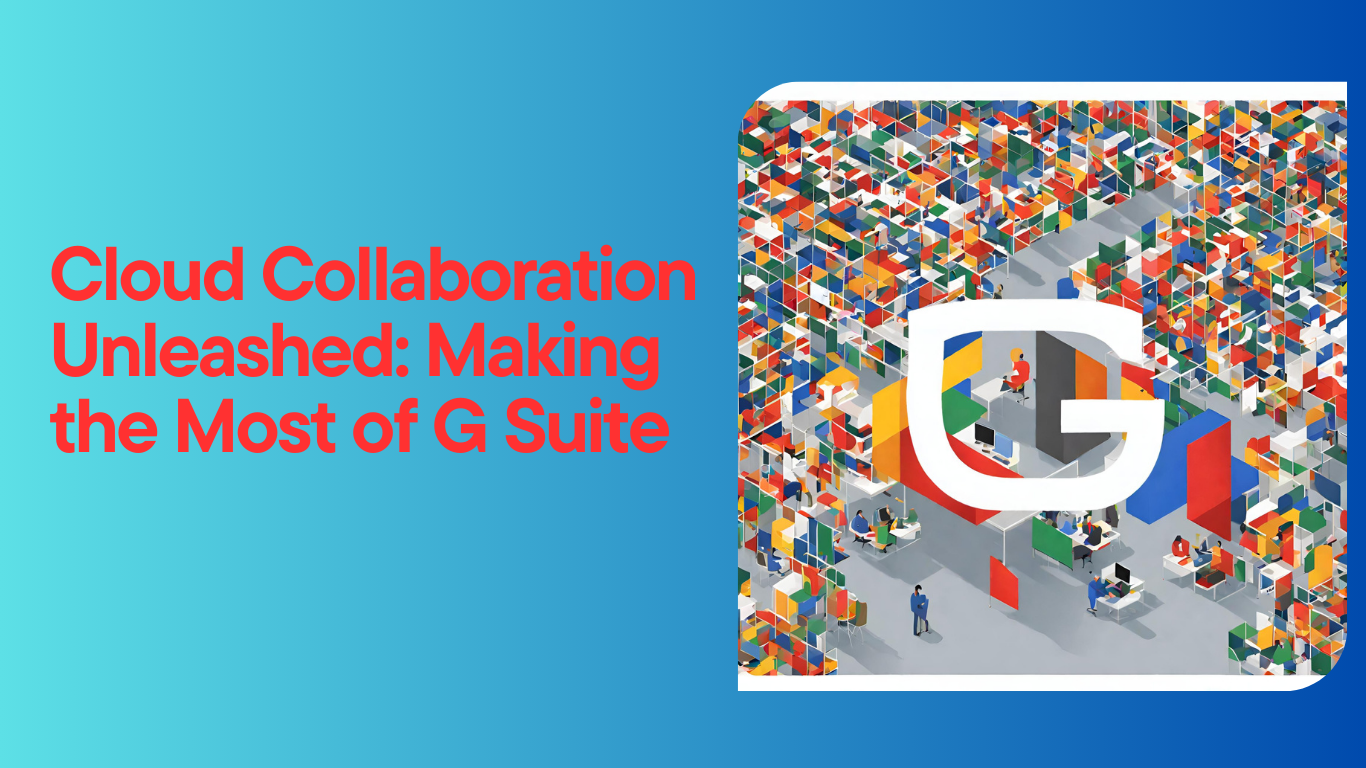
Cloud Collaboration Unleashed: Making the Most of G Suite
In today’s fast-paced digital landscape, effective collaboration is the cornerstone of success for businesses worldwide. With the emergence of cloud-based solutions like G Suite, organizations are empowered to transcend geographical barriers and streamline their workflows like never before. However, unlocking the full potential of G Suite requires more than just adopting the tools—it demands a strategic approach that prioritizes creating helpful, reliable, and people-first collaboration environments.
Harnessing the Power of G Suite
G Suite, Google’s suite of cloud computing, productivity, and collaboration tools, offers a comprehensive array of applications such as Gmail, Google Drive, Google Docs, Sheets, Slides, and many more. These tools are designed to enhance communication, facilitate real-time collaboration, and boost productivity across teams of any size.
Creating Helpful Collaborative Environments
At the heart of effective collaboration lies the concept of creating helpful environments that empower teams to work together seamlessly. Here’s how you can leverage G Suite to foster a culture of collaboration:
- Centralized Communication: Utilize Gmail as a central hub for communication, enabling teams to exchange ideas, share updates, and coordinate tasks effortlessly. Leverage features like threaded conversations, labels, and filters to organize discussions and stay on top of important messages.
- Real-Time Collaboration: Google Docs, Sheets, and Slides enable multiple users to work on documents simultaneously, fostering real-time collaboration and eliminating the need for tedious version control. Encourage team members to collaborate on documents, provide feedback, and iterate on ideas in a dynamic and iterative manner.
- Streamlined File Sharing: With Google Drive, securely store, access, and share files from anywhere, on any device. Leverage sharing settings to control access permissions and ensure that team members have the right level of access to relevant documents and resources.
- Integrated Task Management: Google Calendar and Google Tasks seamlessly integrate with G Suite, allowing teams to schedule meetings, set deadlines, and manage tasks efficiently. Leverage these tools to create shared calendars, assign tasks, and keep everyone aligned with project timelines and milestones.
Building Reliable Collaboration Frameworks
Reliability is paramount when it comes to collaboration, ensuring that teams can depend on the tools and processes in place to support their work. Here’s how to establish a reliable collaboration framework with G Suite:
- Robust Security Measures: Implement security best practices to safeguard sensitive data and protect against cyber threats. Leverage G Suite’s built-in security features, such as two-factor authentication, data encryption, and access controls, to ensure the integrity and confidentiality of your organization’s information.
- Regular Backup and Recovery: Establish backup and recovery procedures to mitigate the risk of data loss and ensure business continuity. Leverage Google Vault to archive and retain critical data, enabling swift recovery in the event of accidental deletion or data corruption.
- Continuous Training and Support: Provide ongoing training and support to empower users with the knowledge and skills needed to leverage G Suite effectively. Offer resources such as tutorials, webinars, and user guides to help team members navigate the tools and troubleshoot any issues they encounter.
- Feedback and Iteration: Solicit feedback from users to identify areas for improvement and refine your collaboration framework over time. Regularly review usage metrics, conduct surveys, and engage with stakeholders to gather insights and make informed decisions about optimizing your G Suite deployment.
Putting People First in Collaboration
Ultimately, successful collaboration is about putting people first—fostering a culture of trust, transparency, and inclusivity that empowers individuals to contribute their unique perspectives and talents towards shared goals. Here are some strategies for prioritizing people in your collaboration efforts:
- Clear Communication Channels: Establish clear communication channels and guidelines to ensure that everyone has a voice and feels heard within the organization. Encourage open dialogue, active listening, and constructive feedback to foster a culture of collaboration and mutual respect.
- Celebrating Diversity: Embrace diversity and inclusion within your teams, recognizing that diverse perspectives lead to more innovative solutions and better outcomes. Create opportunities for cross-functional collaboration and celebrate the unique contributions of each team member.
- Empowering Remote Work: With the rise of remote work, prioritize flexibility and remote-friendly collaboration tools to accommodate diverse workstyles and locations. Leverage G Suite’s cloud-based infrastructure to enable seamless collaboration regardless of geographical boundaries.
- Fostering a Culture of Learning: Cultivate a culture of continuous learning and development, encouraging team members to expand their skills and knowledge. Provide access to training resources, mentorship programs, and professional development opportunities to support individual growth and collective success.
Conclusion
By harnessing the power of G Suite and prioritizing helpful, reliable, and people-first collaboration practices, organizations can unlock new levels of productivity, innovation, and success. Whether you’re a small startup or a global enterprise, embracing cloud collaboration with G Suite can revolutionize the way your teams work together and drive sustainable growth in today’s digital age.
FAQs
- What is G Suite?
- G Suite is a suite of cloud-based productivity tools developed by Google, including Gmail, Google Drive, Docs, Sheets, and more, designed to enhance collaboration and productivity.
- How can G Suite improve collaboration?
- G Suite offers real-time collaboration features that allow multiple users to work on documents simultaneously, streamlining communication, fostering teamwork, and boosting productivity.
- Is G Suite secure for business use?
- Yes, G Suite incorporates robust security measures such as two-factor authentication, data encryption, and access controls to protect sensitive information and ensure the integrity of your organization’s data.
- Can G Suite accommodate remote work?
- Absolutely, G Suite’s cloud-based infrastructure enables seamless collaboration and communication from anywhere, making it ideal for remote teams and distributed workforces.
- What resources are available for learning G Suite?
- Google provides a wealth of resources including tutorials, webinars, and user guides to help users navigate G Suite effectively. Additionally, there are many online courses and training programs available for more in-depth learning.
